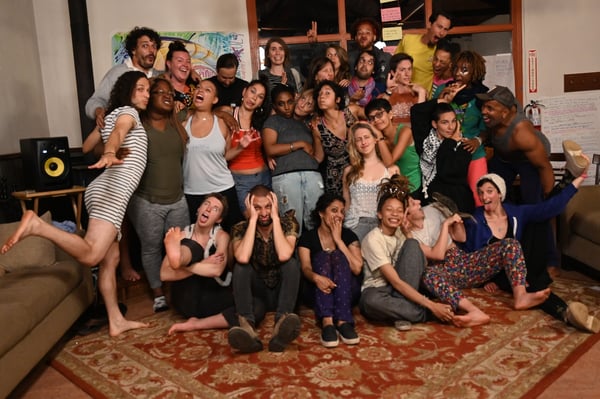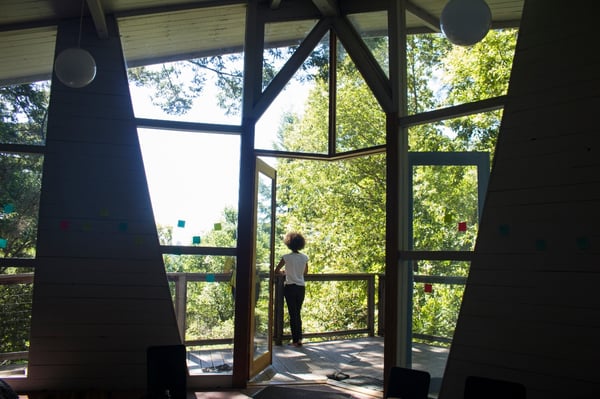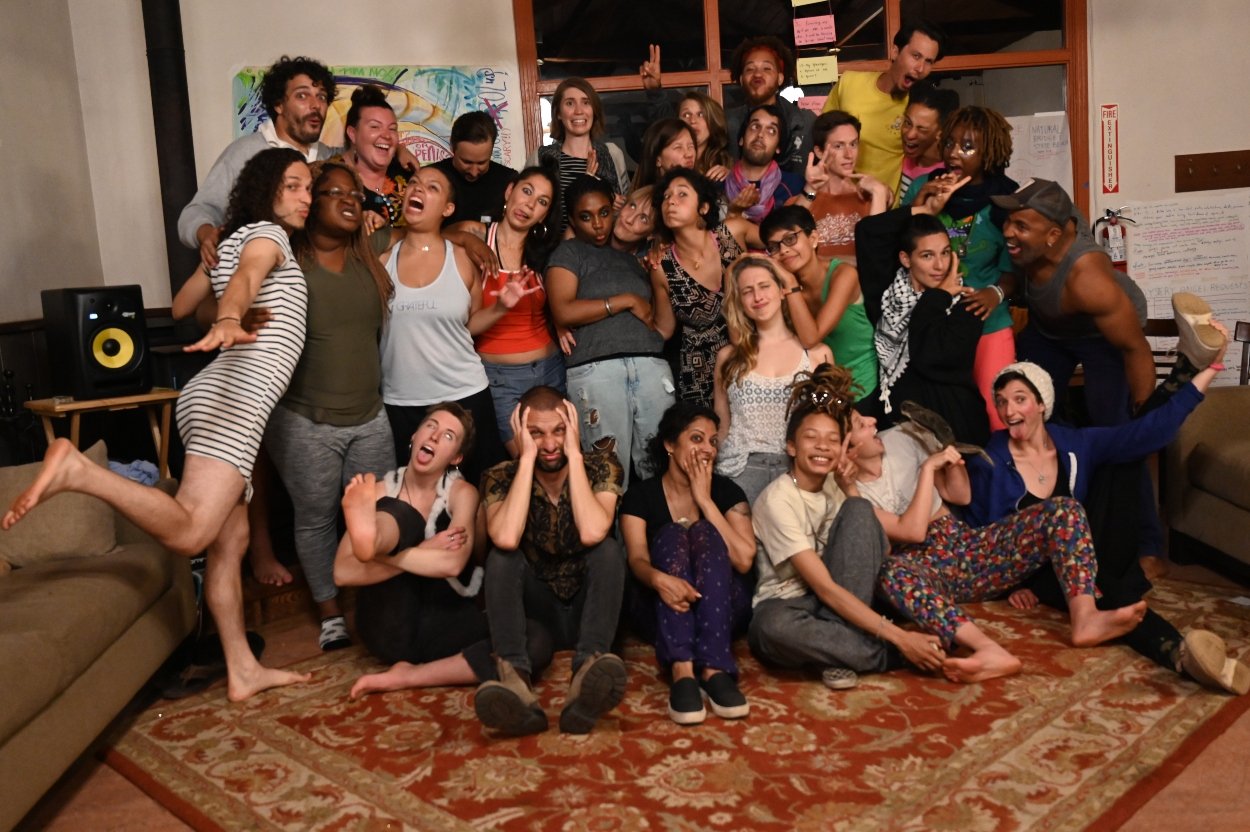Deepening My Practice in the Conflict Management and Resolution Program
The following post was contributed by Nandita Batheja, a student in the Kroc School's Master of Science in Conflict Management and Resolution Program.
A few years ago, I was sitting on the floor in a circle, in the middle of a redwood forest in California. I was one of five facilitators leading the Arts for Social Change Jam – a week-long experience for artist-activists, where we gather to explore and deepen our efforts to dismantle oppressive systems on the personal, interpersonal, systemic and ideological levels. My friend/co-facilitator was leading a session on conflict. They spoke to the group with a glint in their eyes:
Most people think of conflict as bad. As violent. And our language—specifically the English language—doesn’t help. It weaponizes experiences of friction. We ‘shoot down’ ideas. We ‘attack’ arguments. We ‘take positions’ and ‘stand our ground’. Conflicts ‘erupt’ and people get ‘entrenched’. We win and lose fights. We ‘pick our battles’. But what if conflict isn’t so destructive?
See, I believe that conflict is inherently neutral. It’s not good or bad. Difference and disagreement can be creative, can open space for discovery even. Maybe we need a new lens for conflict. For example, I’m a capoerista…and I love capoeira because it is so much about play. It isn’t actually about ‘defeating’ each other, it’s about mischief, creativity, the dance between two martial artists. And it makes me think: what if we dance conflict? What if we sing conflict? Play conflict? What if we embrace conflict as a creative opportunity, instead of something that brings pain, suffering and more violence?
The group fell quiet, pausing in reflection. It seemed that not many people had considered the notion that conflict could be neutral. I was grinning; my friend has a way with language, and they described so beautifully what we were all there to practice: Conflict as creative process. Conflict as an invitation for those involved to heal.
As another friend and mentor of mine, Shilpa Jain, says, “Conflict is the spirit of a relationship asking itself to deepen.” Through participating in, and later facilitating YES! Jams, I had lived the transformative power of conflict many times over. I began to develop a new relationship with conflict: not fearing it, but bowing to it. I devoted myself to the practice of dancing conflict, to unlearn habits of shaming, blaming and righteous fighting, and instead to approach with curiosity, humility and even artistry.

2019 Arts Jam Group
The Questions That Led Me to the Kroc School
How exactly did I go from hashing out oppressive systems in the middle of a forest to enrolling in the Kroc School’s Master’s in Conflict Management and Resolution (MS-CMR) program? From the story above, that may seem obvious. Or it may seem like a step backwards. I was already in the field, working as a facilitator for social justice organizations. What did I need a degree for? This was a particularly important question for me, given that I deeply dislike institutions, believe in the unschooling movement, had already tried grad school once and quit (because I couldn’t stand being in an ivory tower that rarely practiced what it preached). Enrolling in another graduate program wasn’t very high up on my list. And yet—
I had reached a kind of limitation in my work. I faced an internal contradiction. There I was, supposedly a bridge-builder and conflict facilitator, and yet I had burned all my own bridges to institutions. On one hand, I knew how liberating alternate forms of learning and working could be. On the other hand, I saw many of my communities struggling with the same old things: not enough funding, difficulty getting their voices amplified, missing connections to powerful political actors who could implement major policy change. We could use some bridges. Apart from these disconnections, I also felt the gaps of my own knowledge. American social justice spaces are often very…American…which is to say that I found a lack of international collaboration, shared exchange, and mutual co-liberation practice. What were people doing internationally to address protracted identity conflict? What were my U.S.-centric narratives missing? What could I not see from my vantage point?
As I sat with these questions, I stumbled upon the Kroc School of Peace Studies. Despite my skepticism, I was intrigued. Professors had years of field experience and were still active practitioners. A few had grown up in the midst of identity-based wars in their own countries; they had very directly lived the work. Students also seemed full of passion, authenticity, and their own stories of struggle. They spoke about coming to the Kroc School with a drive to address the violent ills impacting their own communities. This didn’t seem like a detached and disillusioned ivory tower—it seemed like a community of people in the collective struggle for justice and peace. I felt a tug. I felt the desire to challenge my own binary thinking. I remembered that while institutions are problematic, people are good, people are just people, trying their best inside and outside and everywhere in between.
Finding Community in the MS-CMR Program
I took a chance and said “yes” to the MS-CMR program. To my own surprise, I genuinely liked it from the start. I felt joyous to have entered a room full of conflict nerds. It’s not a particularly popular type of person to be honest, and yet everywhere I turned, I found peers and faculty who were as voracious as I for methods, philosophies, ideas, stories, experiences and experiments that could help us better navigate the violent systems and issues that permeate our world. I had landed in a place that welcomed my challenges and push-back. The program, by its nature, allowed me to study my own conflict with institutions, to examine how they perpetuate the same violence they are purported to disrupt. Not only did professors and peers encourage me to advocate for change, even if directed at USD, but they also helped me sharpen my strategies.

As cliché as it sounds, over my time here, my classmates have become my most valued teachers, colleagues and collaborators. We take turns working through our dilemmas: How to address continually high rates of femicide in Mexico, even after couples get free mediation sessions specifically designed to lower rates of domestic violence? How to handle community/police relations in the U.S., eliminating the immediate, persistent violence against black and brown bodies, while also transforming the racist and punitive fabric of America’s infrastructure? How do you get more Armenians and Azerbaijanis to come to peace dialogues, breaking the bubble of the same group of young people who show up every time so the conversation can actually spread? These are the kinds of challenges my classmates and I work on daily, testing out our theories in class, and then applying them in our work in the world.
Ultimately, while I have not fundamentally changed my approach as a facilitator, I did significantly grow my methodologies, push my thinking and deepen my knowledge. I’ve been fortified in (re)discovering the many bridges that can hold me and all my tensions as I traverse into and out of spaces I disagree with. As I prepare to graduate and expand my facilitation practice, I feel encouraged by the ways I struggled with school and the ways that I thrived. This, after all, is the dance. I still don’t love institutions, but I am, perhaps, a slightly better dance partner.
About the Author
Nandita Batheja is a facilitator, artist and educator who works across sectors, advocating for justice, liberation and creative being. She believes imagination is crucial to change-work and that play is freedom’s underdog. She has trained in several facilitation methods, community arts practices and social impact design. She is currently attaining her MS in Conflict Management & Resolution, alongside studying the somatics of living, aging and dying to better support individuals and groups in tumultuous times. Nandita facilitates leadership development and conflict transformation for YES!, Equal Justice USA, Seeds of Peace, InterPlay, and communities in conflict.
Contact:
Justin Prugh
jprugh@sandiego.edu
(619) 260-7573

About the Author
The Joan B. Kroc School of Peace Studies (Kroc School) at the University of San Diego is the global hub for peacebuilding and social innovation. Founded in 2007, the Kroc School equips the next generation of innovative changemakers to shape more peaceful and just societies. We offer master's degrees in peace and justice, social innovation, humanitarian action, conflict management and resolution, and a dual degree in peace and law — programs that have attracted diverse and dynamic students from more than 50 countries. In addition to our graduate programs, the Kroc School is home to the Kroc Institute for Peace and Justice (Kroc IPJ). Founded in 2001, the Institute supports positive change beyond the classroom. Through groundbreaking research, experiential learning, and forward-thinking programs, the Kroc School and Kroc IPJ are shaping a future in which peaceful co-existence is the new normal.






